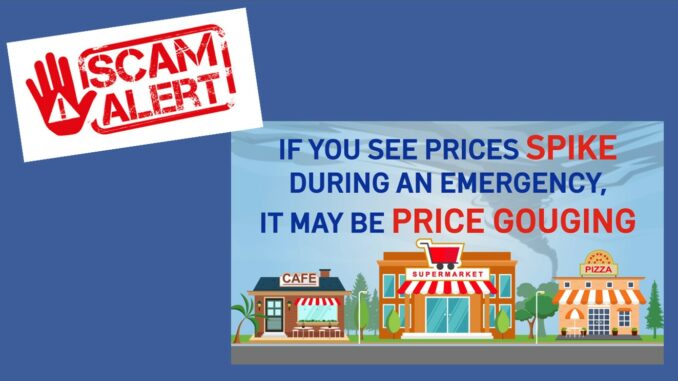
During a declared state of emergency, it is illegal for a business to increase its prices for essential goods or services by more than 10 percent, unless they can show their own costs have been increased.
From the office of District Attorney Summer Stephan: San Diego rarely has to deal with weather so severe and disastrous that a state of emergency is declared. But when it does happen, as it did in late January and early February when monster storms are causing flooding and other devastating effects, be warned that scammers will inevitably prey on homeowners and tenants trying to rebuild what they lost.
The recovery process for people suffering from disasters, including their homes and businesses getting flooded, is difficult. The District Attorney’s Office will not tolerate any unlawful activity by greedy businesses, contractors or scammers who would seek to financially exploit victims of a disaster. For example, price gouging and unlicensed contracting during a state of emergency is not only a crime, it also can further victimize someone who may have already suffered a heavy loss.
A state of emergency was declared in San Diego after the storm on January 22, in anticipation that resources and assistance from the state and federal government may be needed. Natural disasters are already devastating. So, when scammers show up at our doors pretending to care about damage to our home or property – ready to spike prices in a time of need, it’s truly the definition of adding insult to injury.
During a declared state of emergency, it is illegal for a business to increase its prices for essential goods or services by more than 10 percent, unless they can show their own costs have been increased.
Here is what the statute applies to:
- Food (including for animals)
- Goods or services used for emergency cleanup
- Medical supplies including isopropyl alcohol and antibacterial products
- Home heating oil
- Building materials
- Housing
- Transportation
- Gasoline
In addition, it is a misdemeanor for a hotel or motel to increase regular rates by more than 10 percent during a declared emergency and for 30 days following the state of emergency.
Consumers should be extremely cautious if approached by aggressive agents, adjusters or contractors after a disaster. Most businesses are honest and have good intentions, but there are always bad actors waiting to take advantage of disaster victims.
Working as an unlicensed contractor during a state of emergency is a felony. Keep these tips in mind when selecting a contractor:
- Ask for proof of licensing such as a pocket license and a second photo ID.
- Always verify that the license number matches the contractor you are dealing with.
- Beware of scare tactics, odd calls or unsolicited contacts.
- Make sure the contractor carries workers’ compensation and liability insurance.
In the aftermath of natural disasters, debris-clearing scams often surface. Do not provide payment upfront and be sure to ask where the debris is being taken. Scammers often ask for money up front and then disappear. Sometimes they dump debris on a neighbor’s property or park, which may cause you to be responsible for the costs and penalties.
The public is also warned to be cautious when dealing with persons soliciting for purported “victim relief” charities. Many legitimate organizations seek contributions during or after an emergency, but scammers often use phony charitable pleas in times like these. Potential contributors should insist on seeing proper credentials before offering to help. Also, make sure you thoroughly vet anyone posing as an insurance agent to verify that the person is a legitimate professional.
Violations of the price gouging statute are subject to criminal prosecution that can result in a year in jail and or a fine of up to $10,000. Violations are also subject to civil enforcement actions including civil penalties of up to $2,500 per violation, injunctive relief and victim restitution.
- File a price gouging complaint, call the District Attorney’s Consumer Protection Unit at: 619=531-3507.
- Connect with the DA online: Sign up for News Alerts from the DA!
- San Diego County District Attorney’s Office: https://www.sdcda.org/


